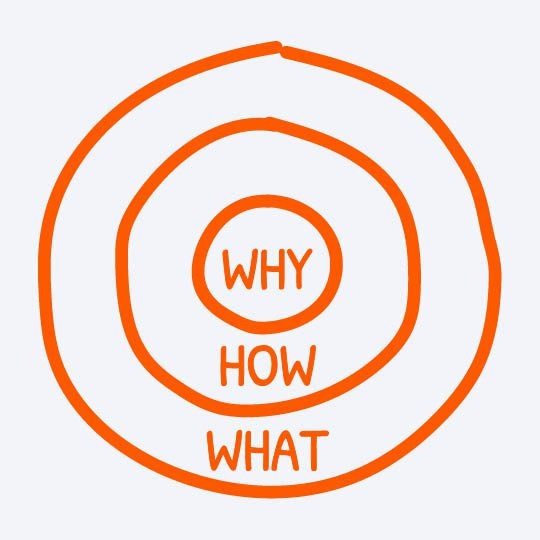Success means living a life true to yourself
Part 4 of How to build your Personal Operating System
You create and prioritize tasks to make them easier to track and complete.
You setup processes to execute those tasks faster and easily and at scale.
You commit resources to the processes you've built so that they work in the best possible way
But why?
Why do any of it?
In this essay I will cover the last part of your Personal Operating System, the WHY to your WHAT (and HOW)
Inverting the Golden Circle

In the book Start with Why, Simon Sinek explains the rationale behind starting with Why. When you start with Why, you create a sense of inspiration, loyalty, and motivation towards your mission, both for you and others.
"People don't buy what you do; they buy why you do it."
Successful individuals and organizations start with Why and they have a clear understanding of their purpose and reason for existence.
If you are undertaking any new endeavor, it makes sense to start with Why before tackling the What and the How.
Why then did we not start with WHY while building out our personal operating system?
Because it is hard.
Starting with Why is ideal, but figuring out your Why means potentially confronting long-held beliefs about your life, including beliefs that have been built over decades. It can be hard to find your Why when you're already busy with so many other things.
David Allen echoed the sentiment more than 20 years ago, in his groundbreaking book Getting things Done.
"Intellectually, the most appropriate way ought to be to work from the top down, first uncovering personal and organizational purpose and vision, then defining critical objectives, and finally focusing on the details of implementation. The trouble is, however, that most people are so embroiled in commitments on a day-to-day level that their ability to focus successfully on the larger horizon is seriously impaired. Consequently, a bottom-up approach is usually more effective."
Starting with Priorities allowed us to kickstart the benefits of building our personal OS, but now it's time to focus on the Why.
How do we start to figure out our why? We start with Values and Principles.
Your values & principles are standards that you want to uphold in your life, regardless of all the other troubles in your life. You want to uphold them simply because they are important to you.
Values and principles are not a means to an end, they are the end themselves.
There are no external rewards linked to it, only internal satisfaction.
Your values from childhood to adulthood
In school I had a subject called Value Education. it was the easiest subject at the time. At least so I thought. The books were full of images and stories of children and people upholding the noble values of discipline, cleanliness, honesty and integrity.
Early to bed, early to rise is healthy, wealthy and wise.
Cleanliness is next to godliness.
Honesty is the best policy
...
We've all heard some versions of these pithy one liners. Many of us probably ignored them in school, more so in college. Yet we all remember them. As I enter my 30s, many of the values I try to uphold are like the ones I was taught more than 20 years ago.
I sometimes think adults teach children the most important things far before they can appreciate the wisdom of what they are being taught.
Childhood is when you think value education is the easiest and least important subject. Adulthood is when you realize it is one of the hardest and most important ones.
With Value Education, those small pithy one-liners encapsulated centuries of human wisdom on how to live a good life and had stood the test of time.
10 year old me cared about passing the test.
Current me cares about living the life I want.
The motivation now is far higher.
Value education in school was based on a fixed syllabus, meaning it forced everyone to accept the same defined values, regardless of preference. The world would probably be a better place if everyone embodied all the values taught in school, but choice is important. The degree to which someone values something can be different.
As an adult you are free to pick and choose the values that matter to you and live up to them.
You don't have to embrace the values your teachers or parents wanted you to. You are free to choose and embody the ones that most resonate with you.
But the usefulness of values also depends on your goals.
The values of dedication, hard-work, discipline can be downright harmful when applied in the wrong direction.
As Mark Manson points out in his essay on Personal values
I think satirizing Hitler’s incredible productivity and influence perfectly embodies a point I’ve long made about the self-help world: achieving success in life is not nearly as important as our definition of success. If our definition of success is horrific—like, say, world domination and slaughtering millions—then working harder, setting and achieving goals, and disciplining our minds all become a bad thing.
He further elaborates on what makes for 'good' and 'bad values'
Good values are:
Evidence-based
Constructive
ControllableBad values are:
Emotion-based
Destructive
Uncontrollable
Some nuance here is important.
All values are not universally virtuous and even virtuous ones don't need to be upheld under all circumstances.
For instance, honesty is usually the best policy, but white lies to help a friend save face in an argument or protect your elderly grandmother from disappointment may be better.
In such cases, the values of friendship and kindness supersede honesty.
Knowing something is different from living it
Knowing your values & principles is not enough; you must live them.
A key part of living up to your values and principles is commitment. Principles are useless unless you are willing to sacrifice for them when it matters.
Historically, people have been willing to risk it all for their values & beliefs.
One of the most famous examples is of Socrates. In 399 BC, Socrates was sentenced to death by the Athenian government for his teachings. In-spite of having the opportunity to escape from prison, he chose to abide by the court's decision as escaping would be inconsistent with his belief to do no wrong
There is no guide that can teach you to live up to your values, but the people who inspire us the most are usually the ones who live a life true to themselves and their values.
People look up to entrepreneurs, musicians, artists, sportspeople partly because they pursue and live up to their dreams, regardless of the challenges they faced.
Michael Jordan valued excellence and would stop at nothing to live up to it. The 6 rings were a result of his pursuit of excellence. This short clip from the incredible documentary - The Last Dance give us a small peek at how he demanded excellence not just from himself but from his entire team, even if it came at the cost of being seen as a tyrant.
Principles are filters for decision making
Knowing your values & principles also confers a big advantage - they can simplify your decision making. Your biggest decisions can be seen through the lens of your principles and the right decisions for you will be clear.
If one of your core values is autonomy, perhaps you might focus on jobs that confer more autonomy or ever consider starting your own business, or maybe one of your values is balance so you might prioritize a job that gives you more time for you and your family
Principles are also applicable outside your personal life. As Ray Dalio points out in his book Principles - they help you compress hard earned wisdom into smaller chunks to simplify decision making. This is useful for dealing with reality to get what you want.
How to know your values
Knowing your values and principles is not so much about finding as it is about recognizing what you already value. It can be hard to articulate what values are most important to you. One of the easiest ways to start is by looking at values that already exist and identifying the ones you connect with. Here is a list of 100 values that I had compiled a while back.
Which values resonate the most?
Which are the ones that you already embody?
Which are the ones you are willing to sacrifice for?
Tests may help as a starting point
Your principles depends on the kind of person you are.
There are plenty of personality tests that can give you a starting point here. The Big 5 is a useful test that can potentially tell you what are some of the things you value.
I personally prefer the PrinciplesYou test by Adam Grant & Ray Dalio. It is fully free and much more relatable as it breaks down the results by Archetypes.
The idea of knowing your values & principles isn't to create a list of values and then refer to them mindlessly like a drone, but more to embody the few ones that you really value and align your life in a way that will fulfill you.
As Friedrich Nietzsche said:
“He who has a ‘why’ to live can bear almost any ‘how."
See all the parts below


